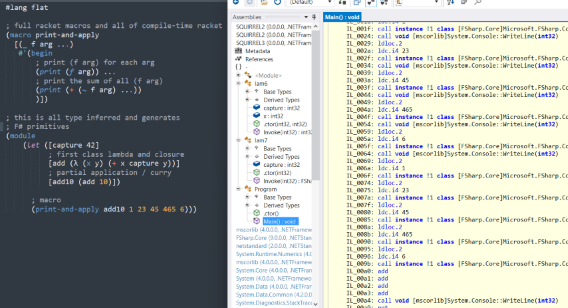Flat - Resurrection!
Flat is a project from way back in 2019. The idea was to build a .NET language in Racket, surfacing the Racket macro system alongside a .NET runtime.

(sorry for the rubbish picture, the scaling killed it)
Flat is a project from way back in 2019. The idea was to build a .NET language in Racket, surfacing the Racket macro system alongside a .NET runtime.

(sorry for the rubbish picture, the scaling killed it)
The previous post layed the foundations of creating a language and “compiler” using Racket macros.
This is all very nice, but utimately it is just a bunch of macros. The “language” itself doesn’t have any form of enforced semantics. You can introduce whatever syntax and macros you want, and use them however you like, even if it makes no sense at all.
Whilst this is nice in a way (and can lead to some .. interesting .. “features”) it is often more of a pain than it’s worth. Most of the errors we make in our day to day programming are picked up immediately by the background compiler, or the full compilation. Silly things like “clipboard inheritance” or typos attempting to use bindings that aren’t in scope are high on the list of culprits here.
In this post we will see how Racket can be used to help out by doing some lexical scope “analysis” in a slightly different way from a traditional compiler. We will also see how Racket can redefine its entire notion of function application, which will allow us to introduce some very nifty new syntax into Scurry itself.
This post will be about Racket macros. As a delivery mechanism, I will be using bits of my latest project, which is a virtual machine designed for emulating multiplayer networked board games via ZeroMQ. drey-vm executes compiled bytecode files - much like the CLR or JVM - using an instruction set of my design.
The design of the computer is out of the scope of this post (maybe another post if people are interested in it - let me know in the comments!?) suffice to stay it is written in D and is mostly a stack based computer, supporting functional and imperative programming. It has a string/object dictionary as its primary type,like lua and js.
Much like asi64, I wrote an assembler for the virtual machine in Racket. On top of that assembler I can now build a language (scurry). To start with, I am just creating a Racket language that is still a lisp - Racket has the fantasic power of being able to build macros on macros, gradually introducing higher level syntatic forms. In this way, I don’t really need write an actual compiler. Racket gives me the front end of the compiler for free (being lisp), and the macros-over-assembler method is a very fun and flexibile way to build up a language.